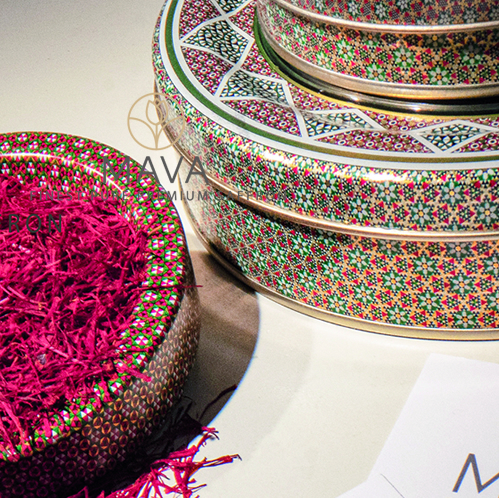Cultivation of Saffron
Saffron cultivation primarily takes place in India, Iran, and Greece. These regions provide the ideal climate and soil conditions for the delicate Crocus sativus flower to bloom and produce the precious saffron threads. The cultivation process involves careful planting and nurturing of the bulbs, followed by meticulous harvesting of the stigmas, which are then dried to obtain the saffron spice1.
Properties of Saffron
Saffron is not just a spice; it is a powerhouse of medicinal properties that have been recognized and utilized in Ayurvedic medicine for centuries. The active components of saffron, including crocin, crocetin, and safranal, contribute to its antioxidant, anti-inflammatory, and anti-depressant properties1.
Promoting Digestive Health
Ayurvedic medicine emphasizes the use of saffron as a potent remedy for digestive ailments. It is believed to stimulate digestion, reduce bloating, and alleviate stomach discomfort. By enhancing the secretion of digestive juices, saffron aids in the absorption of nutrients and improves overall gut health1.
Boosting Mental Well-being
Saffron is celebrated in Ayurveda for its mood-enhancing capabilities. Its golden hues are said to balance emotions, reduce stress, and combat anxiety, making it beneficial for managing a range of mental health conditions. Saffron's active components help increase serotonin levels, promoting feelings of happiness and contentment.
Anti-inflammatory and Pain Relieving Properties
Saffron's anti-inflammatory properties make it a sought-after ingredient in Ayurvedic remedies for joint issues. Ancient texts describe its natural ability to reduce inflammation and relieve joint pain. It is often used in poultices, oils, or special herbal formulations to alleviate discomfort caused by arthritis and other inflammatory conditions.
Skin Nourishment
Ayurveda recognizes saffron's potential to beautify the skin. Its antioxidant properties help protect the skin from free radicals, providing a natural anti-aging effect. Ayurvedic preparations using saffron are known to improve complexion, reduce blemishes, and promote healthy and glowing skin.
Supporting Respiratory Health
Ayurvedic medicine includes saffron as a crucial ingredient in remedies for respiratory issues. Its antibacterial properties can help clear congestion, relieve coughs, and ease breathing difficulties. Saffron is often incorporated into herbal formulations used to treat asthma, bronchitis, and other respiratory ailments.
Incorporating Saffron in Ayurvedic Therapies
Saffron's extensive use in Ayurvedic remedies showcases its significance and effectiveness in this traditional system of healing. Ayurvedic practitioners harness the power of saffron through various means, including oral consumption, topical applications, and incorporating it into herbal formulations1.
Saffron Packages for Holistic Wellness
If you're interested in experiencing the wonders of saffron for your holistic wellness journey, premium and pure saffron packages are available to purchase online. These saffron packages are carefully sourced and provide you with the highest quality saffron threads. By incorporating saffron into your daily routine, you can unlock its potential to enhance digestion, boost mental well-being, relieve inflammation, nourish the skin, and support respiratory health2.
Boosting Mental Well-being
In Ayurveda, saffron is celebrated for its mood-enhancing capabilities. Its golden hues are said to balance emotions, reduce stress, and combat anxiety, helping in the management of a range of mental health conditions. Traditionally used in the treatment of depression, saffron's active components help increase serotonin levels, promoting feelings of happiness and contentment.
Anti-inflammatory and Pain Relieving Properties
Saffron's anti-inflammatory properties make it a sought-after ingredient in Ayurvedic remedies for joint issues. Ancient texts describe its natural ability to reduce inflammation and relieve joint pain. It is often used in poultices, oils, or special herbal formulations to alleviate discomfort caused by arthritis and other inflammatory conditions.
Skin Nourishment
Ayurveda recognizes saffron's potential to beautify the skin. Its antioxidant properties help protect the skin from free radicals, providing a natural anti-aging effect. Ayurvedic preparations using saffron are known to improve complexion, reduce blemishes, and promote healthy and glowing skin.
Supporting Respiratory Health
Ayurvedic medicine includes saffron as a crucial ingredient in remedies for respiratory issues. Its antibacterial properties can help clear congestion, relieve coughs, and ease breathing difficulties. Saffron is often incorporated into herbal formulations used to treat asthma, bronchitis, and other respiratory ailments.
Saffron, with its delightful aroma and vibrant color, has firmly woven itself into the rich tapestry of Ayurvedic remedies. This ancient herb, infused with potent medicinal properties, offers a myriad of health benefits, from digestive well-being to the promotion of mental health and the nurturing of beautiful skin. Incorporating saffron into Ayurvedic therapies deeply showcases the wisdom and efficacy of this traditional system of healing. So, embrace the power of saffron and experience the wonders it can bring to your holistic wellness journey.
Saffron, with its remarkable properties and rich history in Ayurveda, offers a multitude of health benefits. From promoting digestive health to boosting mental well-being and supporting respiratory health, saffron has a wide range of applications in Ayurvedic remedies. By incorporating saffron into your lifestyle, you can harness its power and experience the wonders it brings to your mind, body, and soul. So, embrace the power of saffron and embark on a journey to holistic wellness with this ancient Ayurvedic remedy.
"Saffron, the golden thread of Ayurvedic healing, weaves a tapestry of wellness for the mind, body, and soul."



